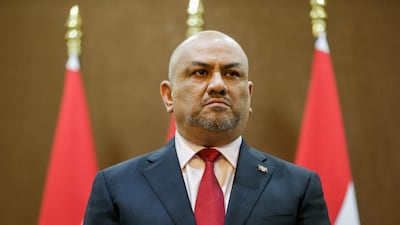Yemen's Foreign Minister Khalid Al Yamani submitted his resignation on Monday, a year after assuming office, government officials told The National.
Mr Al Yamani, 59, who previously served as Yemen’s representative at the UN, advocated that peace in Yemen would be achieved through negotiation and diplomacy.
“The reasons behind the minister’s resignation are unclear,” the official said.
“President Abdrabu Mansur Hadi has so far declined to discuss his resignation, but later tonight [Monday] everything will be unveiled,” the official said.
Ahmed bin Mubarak, Yemen's ambassador to Washington, and former foreign minister Abu Bakr Al Qirbi are among the candidates favoured to succeed Mr Al Yamani.
He assumed office last May, replacing Abdul Malik Al Mekhlafi, who held the position for nearly three years.
Meanwhile, an aide to UN chief Antonio Guterres is expected to meet Mr Hadi in Saudi Arabia on Monday night, the official said.
Yemen’s government last month accused the UN’s envoy to the country, Martin Griffiths, of siding with the Iranian-backed Houthi rebels and recognising them as a “de facto government”.
Mr Hadi said in a letter to Mr Guterres that his envoy had a “poor understanding” of the Yemeni conflict, which made him unfit for his post.
Mr Al Yamani led the government’s delegation during UN-led peace talks in Geneva and Sweden last year.
The talks presented a glimmer of hope as all sides appeared to be more positive than during September's round of talks in Geneva, which failed to bring the Houthis to the table.
Negotiations in the Swedish village of Rimbo produced agreements on a prisoner exchange, the ceasefire in Hodeidah, which is the main entry point for desperately needed food and aid, and for talks on a ceasefire in Taez.
The government believed the talks in Sweden could spark a political process to end a conflict that has left the country on the brink of famine and created what the UN calls a “living hell for millions of children”.
But the Swedish deal is yet to be implemented.
Experts believe that if the warring parties abide by what was agreed to in Stockholm, it could form the foundation of a peace process that slowly rebuilds trust between them.
If not, it could take a long time to get them back to the negotiating table.
Yemen’s internationally recognised government, supported by a Saudi-led Arab Coalition, has been battling Houthi rebels across much of the country since 2014.
The internationally recognised government is based in the southern port city of Aden after the Houthis overran the capital Sanaa.
The fighting in the country has killed an estimated 60,000 people and left millions suffering from lack of food and medical care, the UN says.


